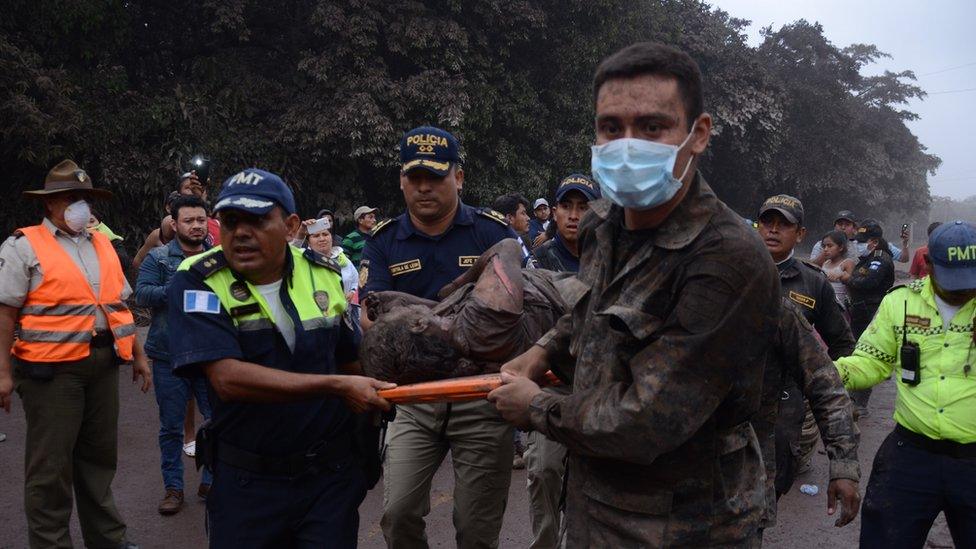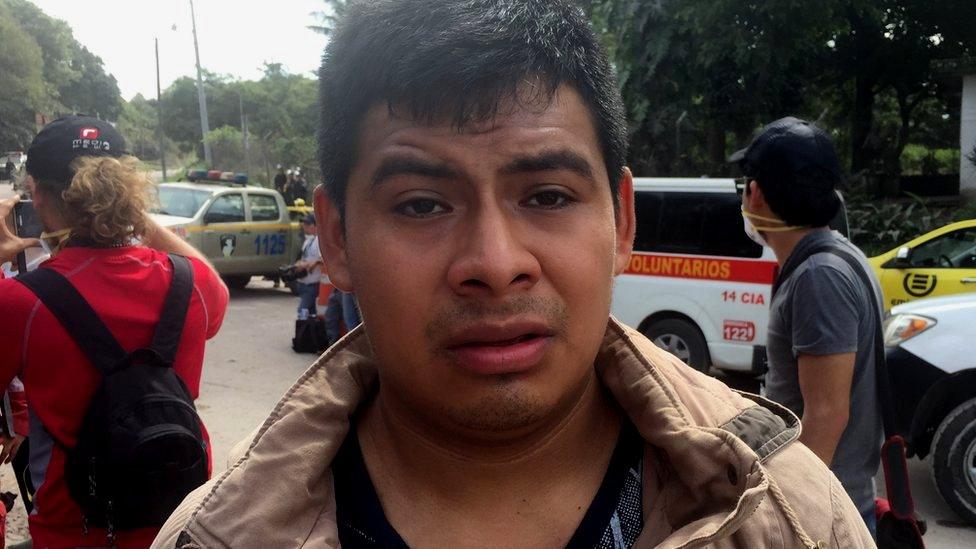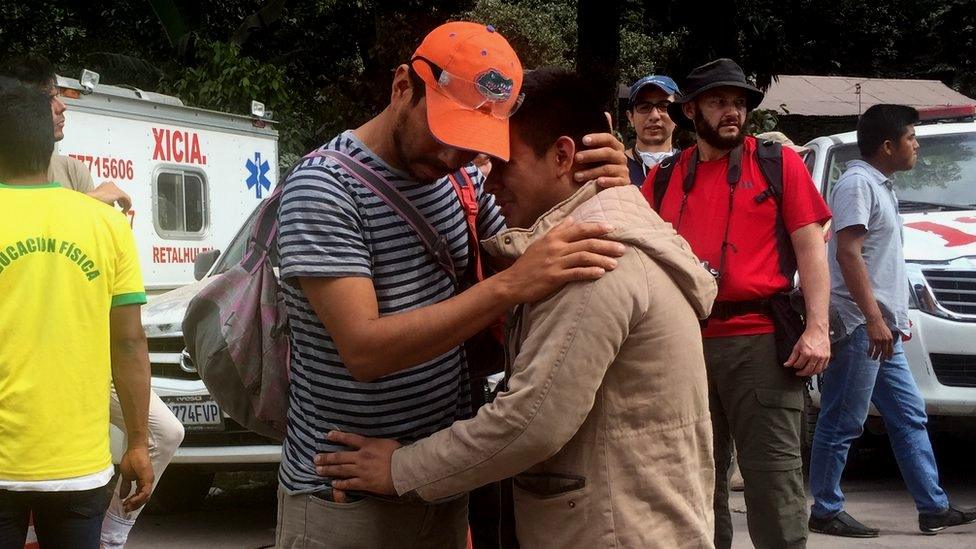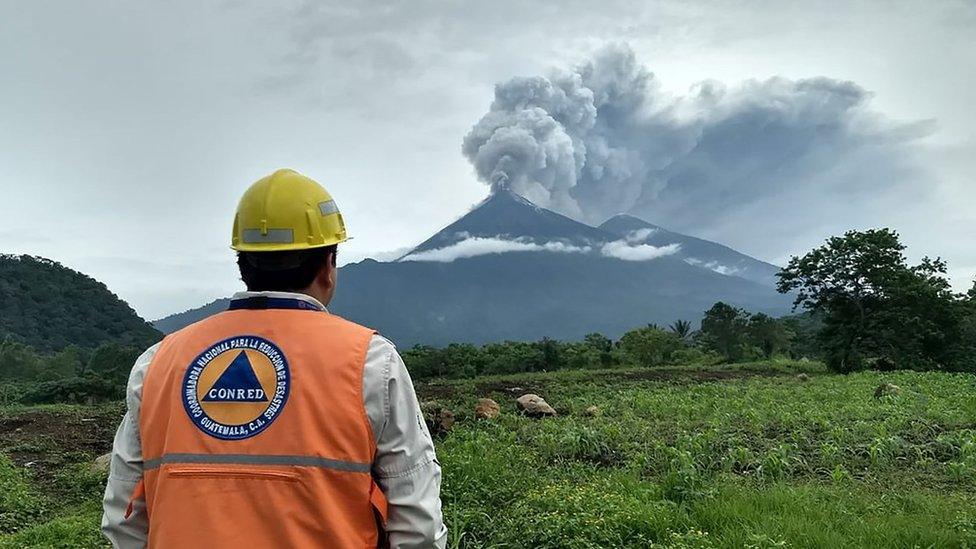Guatemala volcano: Stories of grief in a village wiped off the map
- Published

Rescue workers carry a wounded man in El Rodeo, near the Fuego volcano
Boris Rodriguez has no-one to turn to now. He lost more loved ones in a single night on Sunday than many do in a lifetime.
Mr Rodriguez's wife, both of her parents, his brother and sister-in-law and their children died when the Fuego volcano in Guatemala erupted.
"I saw the children's bodies," he told me between sobs. "They were huddled together in the bed, like they were trying to hide from what was happening."
If Mr Rodriguez, who is 25, were a solitary case, it would be heartbreaking enough. But most of his neighbours in the village of El Rodeo have similar stories of grief. The village was almost entirely wiped off the map. He was saved only because he was working lower down the mountain, in the city of Escuintla, for a transportation company.
"After the eruption I managed to cross over the coffee plantations on the hillsides and found the tin homes completely buried," he said.

Boris Rodriguez lost his wife and her family in the eruption
Beyond the security cordon in El Rodeo, it was clear what he meant. Cars had been tossed around like they were discarded toys. The river of ash and dust reached waist height in many areas, and the ground was still piping hot.
"The most complicated thing here is trying to salvage some of these homes because there is a lot of material that is still boiling and some areas still on fire," said Captain Carlos Valenzuela, the lead co-ordinator of the rescue effort.
The number of confirmed dead stands at 75 but the civil emergency authority announced that around 200 people were missing, raising fears that the death toll will increase substantially.
"We don't have an exact number of dead because we know there are whole families that have disappeared and no one has claimed them," said Capt Valenzuela.

Boris Rodriguez is comforted after the volcano near-destroyed his village
It is possible they are in different shelters and haven't been able to communicate with each other, said Capt Valenzuela. "We just can't say yet."
The authorities, fearful of further injury or accidents, were tightly controlling the entrance to the village, meaning many residents had still not been able to return to their homes to recover what was left.
To some survivors, the emergency response was woefully disjointed and disorganised.
"No-one is telling us where to go, what to do," said Maria Turen. She did not know where her mother was and feared her home had been obliterated. "I want to see my house but they won't let me up," she said. "I don't know anything."
Outside some homes, family dogs stood waiting in vain for their owners. Rescue workers were ferrying strays and livestock down the hillside. The dust resembled deep snow except for its slate grey colour and the lingering odour of burning.

A disaster agency worker looks on as an ash plume rises from the volcano
Then suddenly on Tuesday, a whistle, an alarm, a panicked run. The vast volcano gave another demonstration of its mighty power, sending a fresh plume of smoke and dust towering over the stricken hills.
Within minutes, the streets were clogged with vehicles trying to find a route down to safety. Mothers carried their children, the elderly were helped by their grandchildren. Anyone with a spare seat in their car offered a lift to those walking past.
Amid the chaos was a sense of Guatemala pulling together in adversity.
Members of the fire service and military were slumped on the patches of grass at the side of the road, taking a moment to gather their breath. Soon the torrential rains returned and night began to fall, halting the rescuers forlorn search for survivors.
Mr Rodriguez held on to a sliver of hope of finding his family.
"God willing, I'll find them," he said. "This has been an act of God and if he has taken them, then there's nothing we can do. But I would like to bury them properly, so that we don't have to suffer any more."